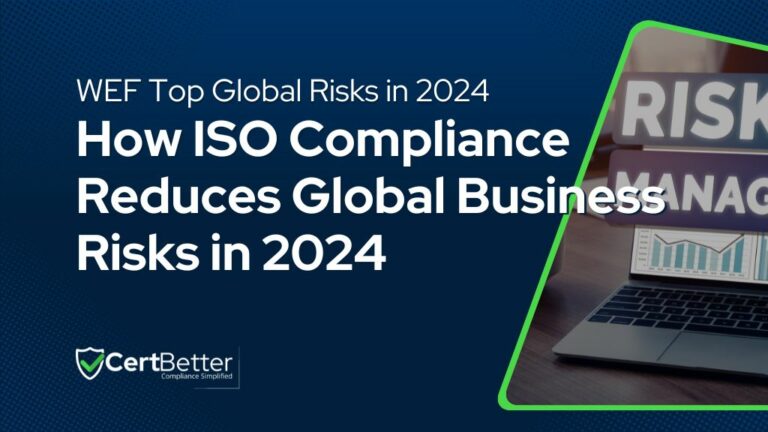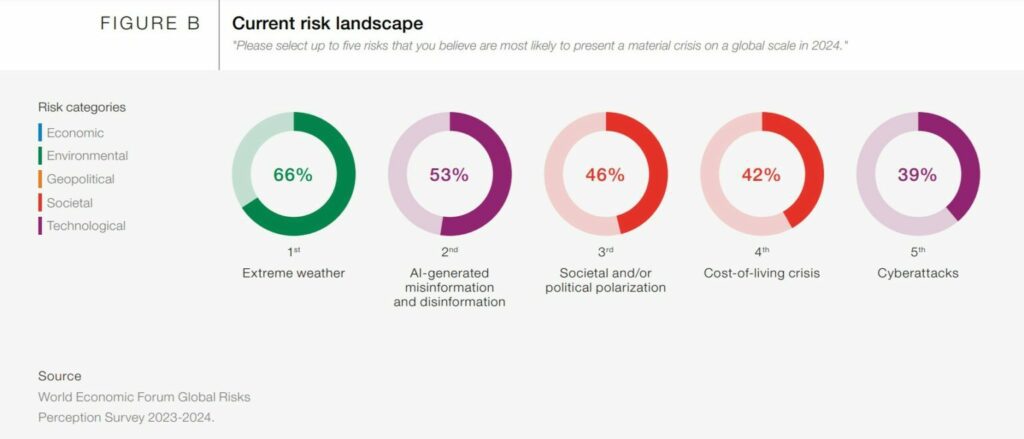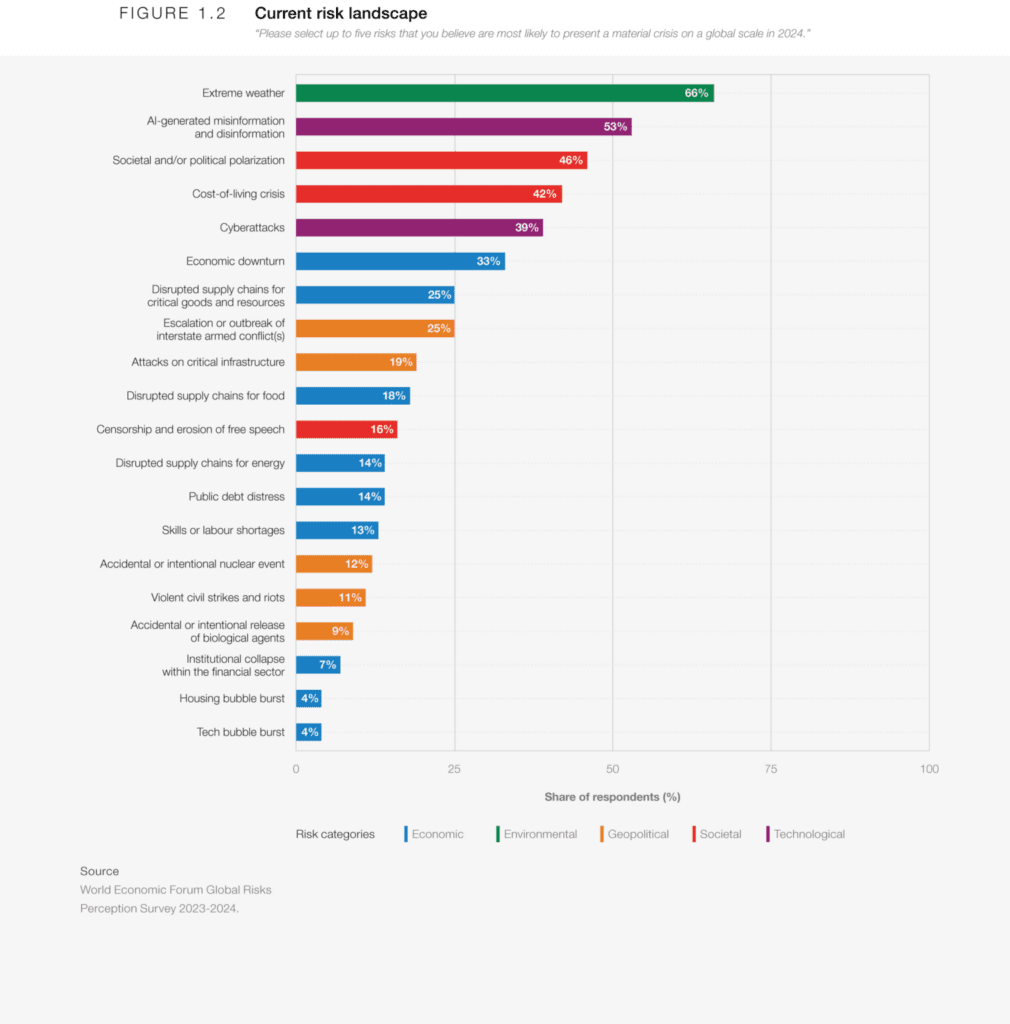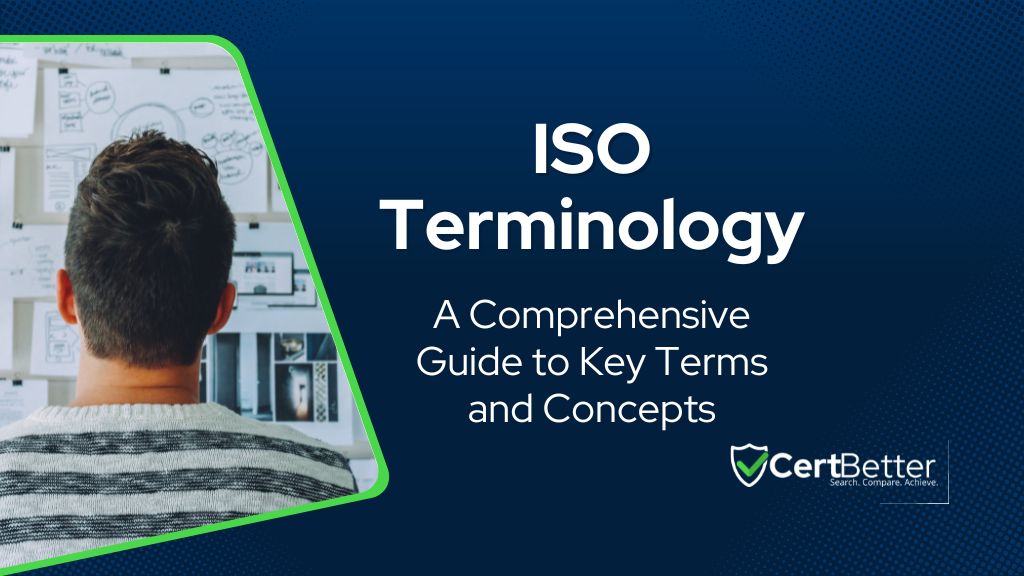How ISO Compliance Reduces Global Business Risks in 2024

As we navigate through 2024, the global risk landscape continues to evolve, presenting new challenges for businesses worldwide. I went through a LinkedIn post where I discovered the current eye-opening global challenges published by the World Economic Forum (WEF). It was shocking to see how the risks have changed in the past couple of years. In this article, I’ll try to explain these current global risks and how ISO compliance can help businesses minimise their impacts.
WEF Managing Director says, “As 2024 begins, the 19th edition of the report is set against a backdrop of rapidly accelerating technological change and economic uncertainty, as the world is plagued by a duo of dangerous crises: climate and conflict.”

From extreme weather events intensified by climate change to the sophisticated realm of AI-generated misinformation, these risks require a strategic and proactive approach. Recognizing and understanding these global risks is the first step towards effective management and mitigation.
How Global Risks Influencing Businesses?
Businesses, known for their resilience and innovative spirit, are not isolated from these global trends. In fact, their role in the global market places them at the forefront of these challenges.
For instance, Australian agriculture and mining industries, which are significant to the global supply chain, are increasingly exposed to risks like extreme weather and economic downturns.
Similarly, the Australian tech industry, a burgeoning sector, faces threats from cyberattacks and misinformation. Navigating these risks effectively not only ensures business continuity but also contributes to global stability.
I strongly believe that business owners and managers must be particularly vigilant as these global risks in 2024 are not just theoretical but have tangible impacts on operations, reputation and profitability.

How ISO Compliance Helps Minimise Global Risks
ISO compliance plays a crucial role in helping businesses address and mitigate global risks. The International Organisation for Standardisation (ISO) develops standards that provide a valuable framework for organisations to manage challenges effectively.
The ISO standards such as ISO 9001 are designed to be universally applicable, regardless of the industry or the size of the organization. By adhering to ISO standards, businesses can understand their organisational context including external and internal influences to make risk-based decisions.
Extreme Weather and Climate Change Adaptation:
ISO standards such as 14001 for Environmental Management enable businesses to reduce their environmental impact and enhance resilience against extreme weather events. On the other hand, ISO 9001 was updated to include climate change in the quality management system.
By following ISO guidelines, companies can implement sustainable practices, reduce waste, and manage resource use more efficiently. This proactive approach not only mitigates the effects of extreme weather but also contributes to global efforts against climate change.
AI-Generated Misinformation and Data Integrity
In the era of digital information, ISO/IEC 27001, which focuses on Information Security Management, is particularly relevant to data integrity. I recently posted an article about how the new ISO standard 42001 for AI is also bringing risk management practices to reduce misinformation and improve responsibility and ethics in the use of artificial intelligence.
This standard helps businesses establish and maintain secure management systems, safeguarding against the risks of AI-generated misinformation. By enhancing their cybersecurity measures and protocols, businesses can ensure the integrity and reliability of their digital content.
Societal and Political Polarisation
ISO standards like ISO 26000, which provide guidance on social responsibility, can help businesses navigate societal and political polarisation. By promoting ethical and transparent practices, companies can foster a culture of inclusivity and respect, contributing to a more harmonious social environment.
Cost-of-Living Crisis
ISO standards such as ISO 9001 for Quality Management Systems can help businesses optimise their operations, reduce costs, and improve efficiency. This can be particularly beneficial during economic challenges like a cost-of-living crisis, enabling businesses to offer more affordable products and services without compromising on quality.
Cyberattacks
With cyber threats on the rise, ISO/IEC 27001 is again crucial for businesses. It provides a framework for establishing, implementing, maintaining, and continually improving an information security management system. This standard helps businesses protect their data and IT systems from cyberattacks, ensuring business continuity and customer trust.
Economic Downturn
ISO standards such as ISO 31000, which focuses on Risk Management, can guide businesses in identifying, assessing, and managing economic risks. By adopting these standards, companies can develop robust strategies to withstand economic downturns, ensuring long-term sustainability.
Disrupted Supply Chains
ISO 28000, specifically for Supply Chain Security Management, enables businesses to manage security within their supply chains comprehensively. By complying with this standard, companies can mitigate the risks associated with supply chain disruptions, ensuring the timely delivery of goods and services.
Global Conflicts and Critical Infrastructure Attacks
Standards like ISO 22301 for Business Continuity Management help businesses prepare for, respond to, and recover from disruptions, including those caused by global conflicts or attacks on critical infrastructure. This standard ensures that businesses can continue their operations under adverse conditions, safeguarding against significant losses.
Labor Shortages
ISO 10018, which focuses on Quality Management – Guidelines on People Involvement and Competence, is crucial for addressing skills or labor shortages. This standard guides businesses in enhancing employee involvement and competence, helping to address the issue of labor shortages effectively.#
Final thoughts
In my honest opinion, maintaining ISO certification provides businesses with a validated, structured and effective approach to managing a wide range of global risks in 2024. By adopting and adhering to these standards, companies not only protect themselves but also contribute to broader efforts to create a more stable, secure, and sustainable global business environment.
- Last updated: June 11, 2024
- CertBetter
Our community of compliance professionals and ISO experts is ready to provide you with insightful answers and practical solutions. Join the discussion now!
- Recommended Reads
- 33 reads
-
Frequently Asked Questions
Understanding ISO Terminology: Guide to Important Terms and Concepts
No posts found
ResetConnect with ISO Certification Consultants
CertBetter makes it easy to find ISO certification consultants and compliance professionals from around the globe.

